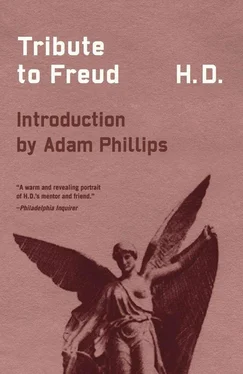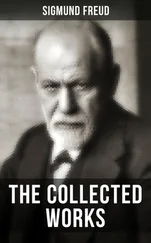I had what Bryher called the “jelly-fish” experience of double ego; bell-jar or half-globe as of transparent glass spread over my head like a diving-bell and another manifested from my feet, so enclosed I was for a short space in St. Mary’s, Scilly Isles, July 1918, immunized or insulated from the war disaster. But I could not stay in it; I re-materialized and Bryher took me to Greece in the spring of 1920.
My older brother and I took our father’s magnifying glass, and he showed me how to “burn paper.” Our father stopped us as he found it dangerous, “playing with fire.”
When I told Professor Freud I was married in 1913, he said, “Ah, twenty years ago.”
Sigmund Freud is like a curator in a museum, surrounded by his priceless collection of Greek, Egyptian, and Chinese treasures; he is “Lazarus stand forth”; he is like D. H. Lawrence, grown old but matured and with astute perception. His hands are sensitive and frail. He is midwife to the soul. He is himself the soul. Thought of him bashes across my forehead, like a death-head moth; he is not the sphinx but the sphinx-moth, the death-head moth.
No wonder I am frightened. I let death in at the window. If I do not let ice-thin window-glass intellect protect my soul or my emotion, I let death in.
But perhaps I will be treated with a psychic drug, will take away a nameless precious phial from his cavern. Perhaps I will learn the secret, be priestess with power over life and death.
He beat on my pillow or the head-piece of the old couch I lie on. He was annoyed with me. His small chow, Yofi, sits at his feet. We make an ancient cycle or circle, wise-man, woman, lioness (as he calls his chow)!
He is a Jew; like the last Prophet, he would break down the old law of Leviticus: death by stoning for the vagrant, and unimaginable punishment for the lawless. The old Victorian law is hard; Havelock Ellis and Sigmund Freud tempered it for my generation.
Kenneth Macpherson called me “recording angel.” I will endeavor to record the grain in the painted apple, in the painted basket, hanging to the left of the wooden dresser, directly in line with my eyes, as I glance up from my notebook. The painting is dimmed by smoke and winter damp, but there must be black seeds in the painted apples, there must be white wine in the painted jug. I wanted to paint like my mother, though she laughed at her pictures we admired so.
My father went out of doors; the stars commanded him. Human souls command Sigmund Freud.
In Corfu, spring 1920, among my many fantasies, I imagined a figure came in sack-cloth; he was not in appearance the conventional Messiah, though his words made me think he was Christ. He said, “You were once kind to one of my people.” To whom was I kind?
There was a Russian-American Jew, John Cournos or Ivan Ivanovitch Korshun, as he said his name was. I don’t think Korshun is the right spelling, but he pronounced it like that and as I remember, he said Korshun meant a hawk.
There was another, a Mr. Brashaer, a famous lens-maker who fitted the lenses to my father’s Zenith telescope. Was this the lens I imagined in the Scilly Isles, or the two convex lenses that I called bell-jars?
I came back from Aegina, from the Hellenic Cruise trip of spring 1932. My daughter was with me; she was just thirteen. I came back from Egypt, 1923, at the time of the Tutankhamen excavations; I came back from the Ionian Islands in 1920.
I saw the world through my double-lens; it seemed everything had broken but that. I watched snow-flakes through a magnified pane of glass.
Who was this that I had been kind to? Mr. Brashaer was small, dark, vivid. He was a famous lens-maker, the most famous in America, perhaps the most famous in the world. He is small in my imagination, this person I was kind to. Is this the magic homunculus of the alchemists?
Freud took me into the other room and showed me the things on his table. He took the ivory Vishnu with the upright serpents and canopy of snake heads, and put it into my hands. He selected a tiny Athené from near the end of the semicircle, he said, “This is my favorite.” The Vishnu was set in the center with the statues arranged either side; there is an engraving of the Professor somewhere, seated at this desk behind or within the circle. He opened the case against the wall and displayed his treasures, antique rings.
We spoke of fees; he said, “Do not worry about that, that is my concern.” He went on, “I want you to feel at home.” Then he said he thought my voice was “delicate” and added, as if there might be danger of my letting outside matters intrude, “I am, after all, seventy-seven.”
I found I was not so shy. I told him of Miss Chadwick and of how I had suffered, during my preliminary sessions with her, spring 1931. I would deliberately assemble all the sorry memories in my effort to get at the truth. He said, “We never know what is important or what is unimportant until after.” He said, “We must be impartial, see fair play to ourselves.”
I told him how the first impression of his room had overwhelmed and upset me. I had not expected to find him surrounded by these treasures, in a museum, a temple. We talked of Egypt. I spoke of the yellow sand, the blue sky, the beetle-scarabs. Then I said that Egypt was a series of living Bible illustrations and I told him of my delight in our Gustave Doré, as a child.
He said how fortunate I had been to discover reality “superimposed” (his word) on the pictures.
I had told him in my last sessions of the Princess and the baby in the basket.
He asked me again if I was Miriam or saw Miriam, and did I think the Princess was actually my mother?
He said a dream sometimes showed a “corner,” but I argued that this dream was a finality, an absolute, or a synthesis. Nor was I, as he had suggested in the first instance, the baby, the “founder of a new religion.” Obviously it was he, who was that light out of Egypt.
But it is true that we play puss-in-a-corner, find one angle and another or see things from different corners or sides of a room. Yes, we play hide-and-seek, hunt-the-slipper, and hunt-the-thimble and patiently and meticulously patch together odds and ends of our picture-puzzle. We spell words upside down and backward and crosswise, for our crossword puzzle, and then again we run away and hide in the cellar or the attic or in our mother’s clothes-closet. We play magnificent charades.
But the Professor insisted I myself wanted to be Moses; not only did I want to be a boy but I wanted to be a hero. He suggested my reading Otto Rank’s Der Mythus von der Geburt des Helden.
March 3, Friday
Remembering Vishnu, I think the ivory is like a half-lily.
I do not know if the white lily was a fantasy, dream, or reality.
I stood looking through the iron railing of the garden, surrounded by a crowd of small boys of assorted ages, brothers no doubt, smaller cousins and the neighboring bandits.
A very old, tall old man is wandering in the garden. With him, there is a younger edition of himself, but the tall young man is the gardener.
The grandfather, godfather, god-the-father sees the children. He summons them to the iron fence. He looks them over. But only one is chosen.
The very small girl staggers forward, overcome, shy yet bold. She crosses the threshold. She stands on the garden path. It is a “real” garden, with sandy path like our grandfather’s garden; it is shut in, however; it is not a very large garden, it is more like a long unroofed room between the house walls. There are trees in the garden, ordinary trees, real trees.
She can only distinguish trees at this time by their fruit or blossom. But these are ordinary trees, in the ordinary time of summer-leaf.
Читать дальше











